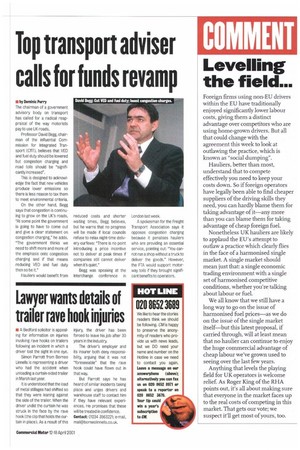COMMENT
Page 9

If you've noticed an error in this article please click here to report it so we can fix it.
Levelling the field...
Foreign firms using non-EU drivers within the EU have traditionally enjoyed significantly lower labour costs, giving them a distinct advantage over competitors who are using home-grown drivers. But all that could change with the agreement this week to look at outlawing the practice, which is known as "social dumping".
Hauliers, better than most, understand that to compete effectively you need to keep your costs down. So if foreign operators have legally been able to find cheaper suppliers of the driving skills they need, you can hardly blame them for taking advantage of it—any more than you can blame them for taking advantage of cheap foreign fuel.
Nonetheless UK hauliers are likely to applaud the EU's attempt to outlaw a practice which dearly flies in the face of a harmonised single market. A single market should mean just that: a single economic trading environment with a single set of harmonised competitive conditions, whether you're talking about labour or fuel.
We all know that we still have a long way to go on the issue of harmonised fuel prices—as we do on the issue of the single market itself—but this latest proposal, if carried through, will at least mean that no haulier can continue to enjoy the huge commercial advantage of cheap labour we've grown used to seeing over the last few years.
Anything that levels the playing field for UK operators is welcome relief. As Roger King of the RHA points out, it's all about making sure that everyone in the market faces up to the real costs of competing in this market. That gets our vote; we suspect it'll get most of yours, too.
































































































